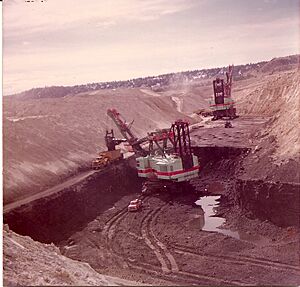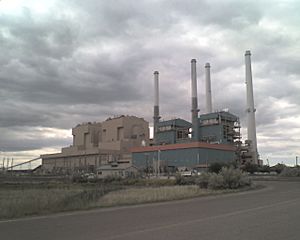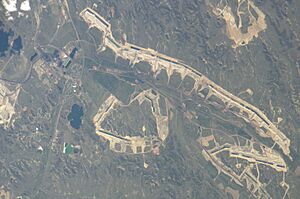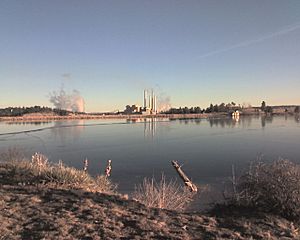Colstrip, Montana facts for kids
Quick facts for kids
Colstrip, Montana
|
||
|---|---|---|
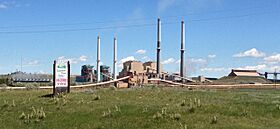
Sign upon entering Colstrip
|
||
|
||
| Motto(s):
Tomorrow's Town Today
|
||
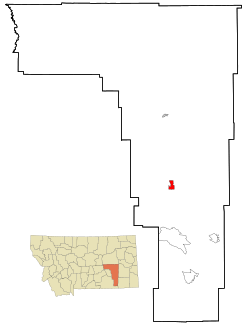
Location of Colstrip, Montana
|
||
| Country | United States | |
| State | Montana | |
| County | Rosebud | |
| Incorporated (city) | 1998 | |
| Government | ||
| • Type | Mayor-Council | |
| Area | ||
| • Total | 4.05 sq mi (10.49 km2) | |
| • Land | 4.05 sq mi (10.48 km2) | |
| • Water | 0.01 sq mi (0.02 km2) | |
| Elevation | 3,202 ft (976 m) | |
| Population
(2020)
|
||
| • Total | 2,096 | |
| • Density | 518.04/sq mi (200.04/km2) | |
| Time zone | UTC-7 (Mountain (MST)) | |
| • Summer (DST) | UTC-6 (MDT) | |
| ZIP code |
59323
|
|
| Area code(s) | 406 | |
| FIPS code | 30-16525 | |
| GNIS feature ID | 2410199 | |
Colstrip is a city in Rosebud County, Montana, United States. In 2020, about 2,096 people lived there.
Colstrip was started in 1924 and became an official city in 1998. It is the biggest city in Rosebud County. The main jobs in Colstrip are coal mining and making electricity. In 2005, Sports Illustrated magazine said Colstrip was the best sports town in Montana. Every year, the community celebrates "Colstrip Days" just before the 4th of July.
Contents
History of Colstrip
Colstrip began in 1924. It was a "company town" built by the Northern Pacific Railway. This meant the railway company owned most of the town. They needed coal for their steam locomotives (trains). The coal was dug up using "open pit strip mining." This is where giant machines called draglines remove the soil to get to the coal underneath.
During The Second World War, the Colstrip mine was very important. It provided coal for trains carrying military supplies. Because of this, the mine was guarded, and workers were not allowed to quit their jobs.
In 1958, trains started using diesel fuel instead of coal. So, the Colstrip mine closed down. But in 1959, a company called Montana Power Company bought the mine and the town. They planned to build power plants that would burn coal to make electricity.
Building the Power Plants
The power plants were built in the 1970s and 1980s. During this time, Colstrip became a "boomtown." This means its population grew very quickly because many people moved there for construction jobs. The first two power plants started working in 1975 and 1976. The third and fourth plants opened in 1984 and 1986.
In 1974, a large lake called Castle Rock Lake was finished. It's about 150 acres big. The Colstrip power plants use steam to make electricity from coal. Water for the steam comes from the Yellowstone River through an underground pipe, about 30 miles long. This water is stored in Castle Rock Lake. The lake is now home to many fish and other wildlife.
In 1990, another power plant, the Colstrip Energy Limited Project, started working. It's about six miles north of Colstrip. This plant was special because it used waste coal.
In 1998, the main power plants (1-4) were sold to new companies, including PPL Corporation and Puget Sound Energy. The Rosebud Coal Mine was also sold. In the same year, Colstrip officially became a city.
Recent Changes
In 2015, the Colstrip plants became part of a new company called Talen Energy.
In 2016, Puget Sound Energy agreed to close two of the coal-burning units (1 and 2) by 2022. This was due to concerns about greenhouse gas emissions (gases that can warm the planet). Units 3 and 4 were planned to stay open.
In June 2019, Talen Energy said they would close two units by the end of the year. The power plant was a big source of greenhouse gases in the U.S.
In January 2020, Unit 1 stopped working, and Unit 2 stopped on January 4. Units 3 and 4 are still running but are expected to close within the next five years.
In 2023, another company, Avista, gave its share of the plant to NorthWestern Energy for free. This happened because a law in Washington state bans electricity made from coal.
Geography
Colstrip covers about 4.47 square miles of land. The city has 30 parks and 300 acres of green space. The coal mining area is a few miles west of town.
About 23 miles south of Colstrip is Deer Medicine Rocks. This is a special place with ancient rock carvings and paintings on sandstone cliffs. The area around Colstrip has many rolling hills and sandstone formations. You can often see deer and pronghorn (a type of antelope) here.
Climate
Colstrip has a semi-arid climate. This means it's usually dry, but not a desert. It gets some rain, but not a lot.
| Climate data for Colstrip, Montana, 1991–2020 normals, extremes 1927–present | |||||||||||||
|---|---|---|---|---|---|---|---|---|---|---|---|---|---|
| Month | Jan | Feb | Mar | Apr | May | Jun | Jul | Aug | Sep | Oct | Nov | Dec | Year |
| Record high °F (°C) | 69 (21) |
72 (22) |
81 (27) |
90 (32) |
99 (37) |
108 (42) |
110 (43) |
111 (44) |
102 (39) |
94 (34) |
80 (27) |
74 (23) |
111 (44) |
| Mean maximum °F (°C) | 57.0 (13.9) |
58.9 (14.9) |
69.5 (20.8) |
77.6 (25.3) |
83.4 (28.6) |
92.0 (33.3) |
98.2 (36.8) |
97.2 (36.2) |
93.3 (34.1) |
81.5 (27.5) |
67.8 (19.9) |
57.3 (14.1) |
99.8 (37.7) |
| Mean daily maximum °F (°C) | 35.8 (2.1) |
37.1 (2.8) |
47.1 (8.4) |
55.4 (13.0) |
64.9 (18.3) |
74.9 (23.8) |
85.0 (29.4) |
84.0 (28.9) |
76.4 (24.7) |
58.1 (14.5) |
45.9 (7.7) |
36.6 (2.6) |
58.4 (14.7) |
| Daily mean °F (°C) | 24.7 (−4.1) |
26.1 (−3.3) |
35.5 (1.9) |
43.7 (6.5) |
53.4 (11.9) |
62.9 (17.2) |
71.1 (21.7) |
69.6 (20.9) |
59.6 (15.3) |
45.9 (7.7) |
34.8 (1.6) |
26.0 (−3.3) |
46.1 (7.8) |
| Mean daily minimum °F (°C) | 13.5 (−10.3) |
15.1 (−9.4) |
23.9 (−4.5) |
31.9 (−0.1) |
41.9 (5.5) |
50.8 (10.4) |
57.2 (14.0) |
55.2 (12.9) |
45.8 (7.7) |
33.7 (0.9) |
23.6 (−4.7) |
15.3 (−9.3) |
34.0 (1.1) |
| Mean minimum °F (°C) | −12.3 (−24.6) |
−7.2 (−21.8) |
2.9 (−16.2) |
17.1 (−8.3) |
27.5 (−2.5) |
39.0 (3.9) |
46.8 (8.2) |
43.8 (6.6) |
32.2 (0.1) |
16.6 (−8.6) |
2.2 (−16.6) |
−7.9 (−22.2) |
−19.4 (−28.6) |
| Record low °F (°C) | −42 (−41) |
−50 (−46) |
−28 (−33) |
−13 (−25) |
13 (−11) |
28 (−2) |
34 (1) |
33 (1) |
5 (−15) |
−8 (−22) |
−32 (−36) |
−38 (−39) |
−50 (−46) |
| Average precipitation inches (mm) | 0.65 (17) |
0.69 (18) |
0.95 (24) |
1.92 (49) |
3.14 (80) |
2.48 (63) |
1.42 (36) |
1.03 (26) |
1.43 (36) |
1.44 (37) |
0.69 (18) |
0.56 (14) |
16.4 (418) |
| Average snowfall inches (cm) | 7.4 (19) |
7.3 (19) |
5.5 (14) |
3.3 (8.4) |
0.5 (1.3) |
0.0 (0.0) |
0.0 (0.0) |
0.0 (0.0) |
0.2 (0.51) |
2.3 (5.8) |
3.9 (9.9) |
6.2 (16) |
36.6 (93.91) |
| Average precipitation days (≥ 0.01 in) | 6.7 | 6.4 | 7.6 | 9.0 | 11.8 | 10.5 | 7.0 | 5.5 | 5.8 | 7.4 | 6.2 | 5.6 | 89.5 |
| Average snowy days (≥ 0.1 in) | 5.5 | 5.3 | 3.3 | 1.4 | 0.2 | 0.0 | 0.0 | 0.0 | 0.1 | 1.1 | 2.4 | 4.4 | 23.7 |
| Source 1: NOAA | |||||||||||||
| Source 2: National Weather Service | |||||||||||||
People in Colstrip
| Historical population | |||
|---|---|---|---|
| Census | Pop. | %± | |
| 2000 | 2,346 | — | |
| 2010 | 2,214 | −5.6% | |
| 2020 | 2,096 | −5.3% | |
| U.S. Decennial Census | |||
The number of people living in Colstrip has changed over the years. Before it became a city in 1998, it was counted as a "census-designated place."
2010 Census Facts
In 2010, there were 2,214 people living in Colstrip. There were 863 households (groups of people living together). Most people were White (84.7%), with Native American people making up 9.0% of the population. About 4.3% of the people were Hispanic or Latino.
About 35.9% of households had children under 18. Most households (61.8%) were married couples. The average age in the city was 38.1 years old. About 28.2% of residents were under 18.
Education
Colstrip Public Schools teach students from kindergarten to 12th grade. The highest school is Colstrip High School. Their sports teams are called the Colts and Fillies.
The closest college is Chief Dull Knife College in Lame Deer. Colstrip is about 20 miles north of the Northern Cheyenne Indian Reservation. Many Cheyenne students from the reservation go to Colstrip High School. They make up about one-third of the students.
Colstrip also has a library called the Bicentennial Library.
Fun Things to Do
Colstrip has many fun things to do. You can go boating and fishing on Castle Rock Lake. This lake was made for the power plants. You can catch fish like bluegill, bass, walleye, and pike there. There's also a 3.2-mile path around the lake for walking or biking. You can also find a picnic area and a beach for swimming.
The Colstrip Parks and Recreation District (CPRD) offers sports programs for kids and adults. These include golf, soccer, basketball, and baseball. CPRD has a weight room, a cardio room, and two gyms. They also take care of the city's bike paths.
Getting Around
Highway 39 goes through Colstrip.
The Colstrip Airport (FAA ID: M46) is a public airport about 3 miles southwest of town. For bigger flights, the nearest commercial airport is Billings Logan International Airport, which is about 124 miles west.
The Colstrip Medical Center provides basic healthcare for the community.
News and Radio
The Independent Press newspaper, based in Forsyth, covers news for Colstrip and all of Rosebud County.
Colstrip has two radio stations. KMCJ is part of Your Network of Praise, and KYPC is part of Yellowstone Public Radio.
Famous People from Colstrip
- Tuff Harris — He played safety for the Pittsburgh Steelers in American football. He played football at Colstrip High School.
- Wally McRae — A cowboy poet who won a special award in 1990 for his work.
See also
 In Spanish: Colstrip (Montana) para niños
In Spanish: Colstrip (Montana) para niños



